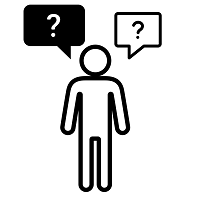Durable Power of Attorney for Health Care
What is it?
Iowa law allows individuals who are eighteen or older to give authority to another person to make health care decisions on their behalf. See Iowa Code chapter 144B. Health care decisions include, basically, any treatment or services involving your physical or mental health. The person who is given the authority to make the health care decisions is called the “attorney-in-fact” and must agree to serve in this role. This person is different from an “attorney-at-law” who is licensed to represent a person in legal matters. The person giving the authority to make the health care decisions is called the “principal.”
When the person signs, or “executes,” a health care power of attorney, the person gives the attorney-in-fact the ability to make decisions on the principal’s behalf if an attending physician or assistant decides that the principal cannot make health care decisions. There must be a decision by a medical provider that you cannot make your own decisions before the power of attorney is in effect or active.
The attorney-in-fact has the same rights as the principal to access medical records and to consent to disclosure of medical information. The attorney-in-fact must carry out the healthcare wishes of the principal to the best of their ability. If the attorney-in-fact does not know the principal’s wishes, the attorney-in-fact must act in the principal’s best interests. An attorney-in-fact will be able to make your health decisions over any other person, including a guardian, unless a court decides otherwise. You can object or disagree with a decision to withdraw or withhold treatment. The law will assume you are able to make that decision unless there is proof that you cannot.
What does it mean that the power of attorney is "durable"?
"Durable" means that the power of attorney is effective even if you are incapacitated, which is another way of saying that you are not able to make your own decisions. The power of attorney is no longer effective once you die as there are no health care decisions to be made for you then.
Why is it important?
A durable power of attorney for health care allows another person to make health care decisions for you and to access your medical information once the power of attorney is in effect. The attorney-in-fact has the power under the law to make your health care decisions. They even have priority over a court-appointed guardian to make health care decisions for you unless the court decides otherwise. Because of this, you want to make sure you understand what events will cause your power of attorney to take effect. You also want to be sure you trust the person and that they understand the decisions and choices you would like them to make for you if you are not able.
How do I create one?
It is a very important legal document that must be executed exactly as provided by law. Getting the help of an attorney to execute the document is not required but is helpful, as is reading and understanding the law before creating and executing the document. The document must specifically name and authorize the attorney-in-fact to make health care decisions, have the date it is executed, and be witnessed or acknowledged by at least two witnesses or a notary. Certain people cannot serve as attorneys-in-fact or as witnesses to the signing of one. For example, a health care provider who is treating you at the time of executing the document cannot be a witness to the document and also cannot serve as an attorney-in-fact. An employee of the health care provider treating the person at the time of executing the document also cannot serve as the attorney-in-fact unless they are related to the person. The person executing a health care power of attorney may provide a second name to serve as the attorney-in-fact if the first person becomes unable or unwilling to serve as the attorney-in-fact.
Can I change my mind?

A health care power of attorney can be revoked at any time, even if the principal does not have the ability to make decisions. The revocation of the health care power of attorney can be made by speaking or writing the intent to revoke. The principal should let the attorney-in-fact known that it is being revoked so they know that they should no longer act on the principal’s behalf, though the principal can also, if there is one, tell the current health care provider. If it is not revoked, the health care power of attorney ends when the principal dies.
Can I include information about my death?
A durable power of attorney for health care may also include a statement, or a designation, which names a person or persons who can make decisions about the final disposition of a person’s body. This can include decisions about burial, interment, cremation, or other forms of disposition of the body and directions as to where the remains should be placed. The person or people can be the same as or different from the person named as the agent under the durable health care power of attorney, but certain language is required in order to make the designation effective by law. The law only allows a person to name someone to make these decisions, the law does not require the named person carry out the deceased person’s wishes, if any. It’s important, then, that a person’s wishes be shared, and that the person chosen to carry out those wishes be trustworthy. The designation can also be done in a document separate from the durable health care power of attorney and attached to it. See Iowa Code chapter 144C.
Where can I get more information?
-
The Office of the Public Guardian (OPG) is an office of the State of Iowa. It provides information about guardianship, conservatorship, and other substitute decision making options for supporting older adults and adults with disabilities; education and resources for guardians and conservators; and guardianship and conservatorship services if there is no other person who can or will serve. A person must qualify for services and there is an application process.
-
Information about applying for OPG services.
-
The OPG can be reached by email at opg@iowa.gov or by phone at 515-725-333 or 800-532-3213.
-
- Iowa Legal Aid is a non-profit agency that provides legal assistance to low-income and vulnerable Iowans. Information can be found on the Iowa Legal Aid website and they can be reached by phone at 800-532-1503 or, for Iowans 60 or older, 800-992-8161. The Iowa Legal Aid website provides information about health care power of attorney documents.
- Iowa Find-A-Lawyer is an online directory of attorneys provided by the Iowa State Bar Association. Information can also be found in its Older Iowans Handbook.
- The Iowa State Bar Association provides a Durable Power of Attorney for Health Care Decisions form.
- Iowa Legal Aid provides a Durable Power of Attorney Health Care Decisions form.
